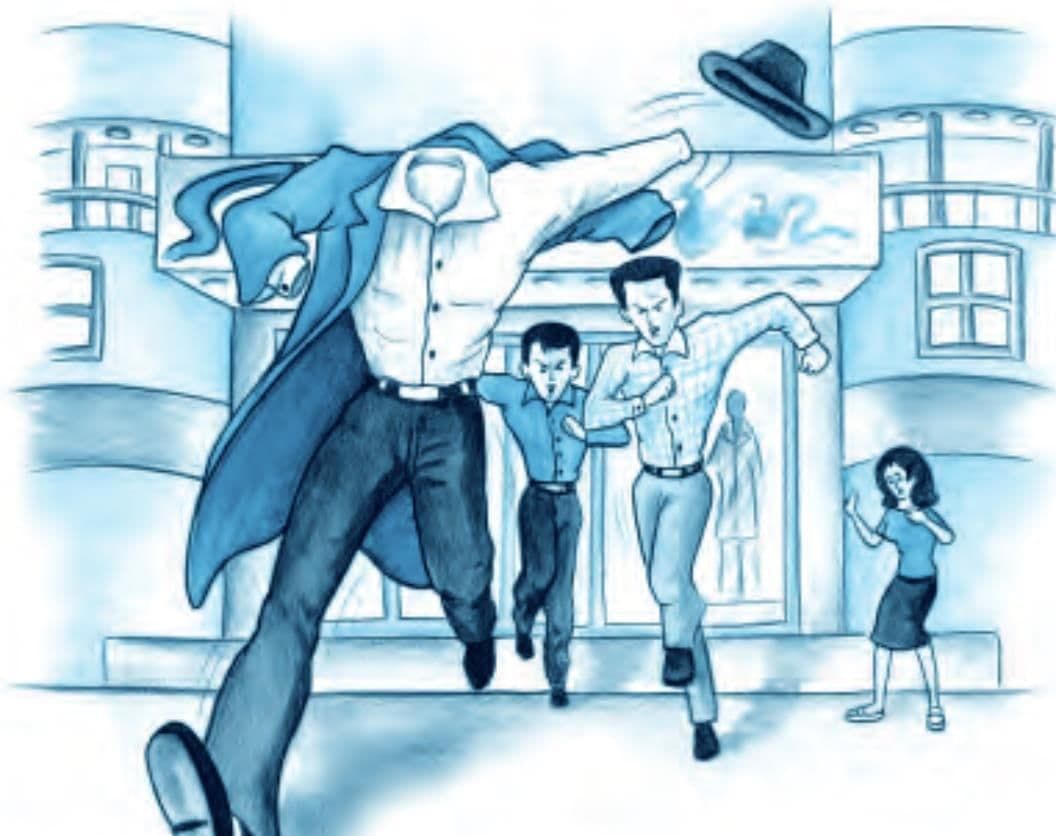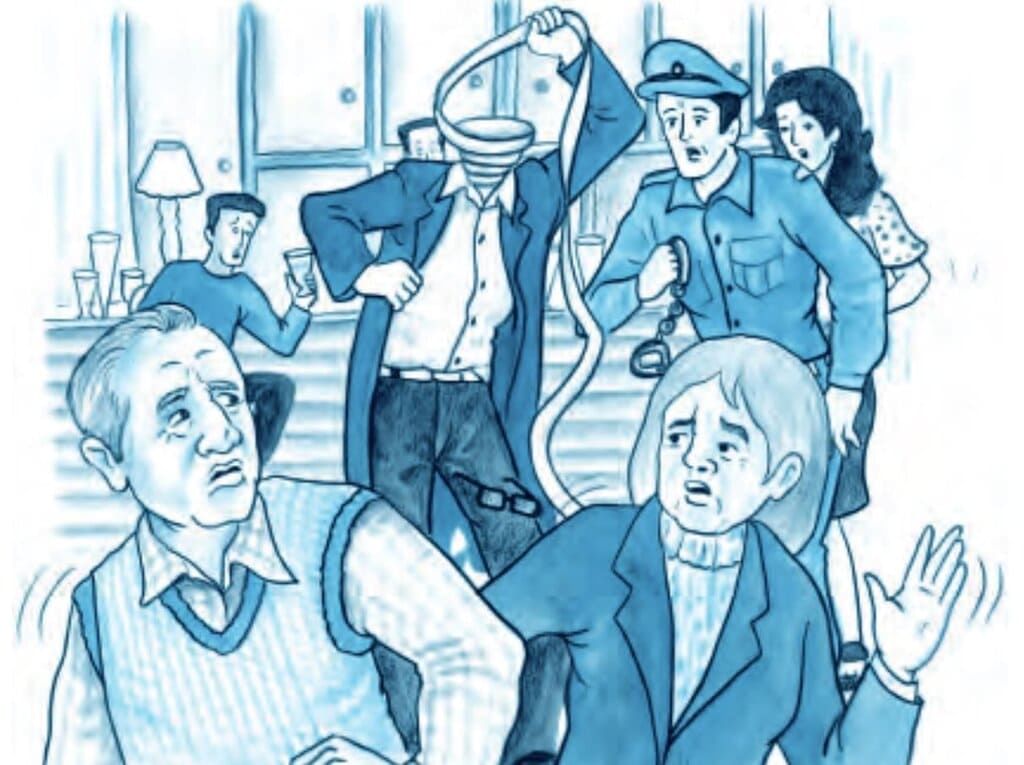NCERT Solutions for Class 10 English Footprints Without Feet Chapter 5 - Footprints without Feet
| Table of contents |

|
| Read and Find Out (Page 26) |

|
| Read and Find Out (Page 28) |

|
| Think about it (Page 31) |

|
| Talk about it |

|
Read and Find Out (Page 26)
Q1: How did the invisible man first become visible?Ans: The invisible man was a scientist, named Griffin. He swallowed certain rare drugs which made him invisible. It was mid-winter when he did the experiment so it was impossible to do without clothes. He slipped into a London store for shelter. When the store closed, he opened some of the boxes and unwrapped them. He adorned himself with shoes, an overcoat and a wide brimmed hat and became a fully dressed and visible person
Q2: Why was he wandering the streets?
Ans: Though Griffin was a brilliant scientist, he was a lawless person. His landlord disliked him and wanted to throw him out so he set fire to his house. To avoid getting caught, he removed his clothes and started wandering on the streets sans clothes and money.
Read and Find Out (Page 28)
Q1: Why does Mrs Hall find the scientist eccentric?Ans: The arrival of a stranger at an inn in winter was in itself a strange occurrence. In addition, the stranger had an uncommon appearance. In spite of Mrs Hall’s attempts to be friendly, he would respond in a cold manner. He told her that he had no desire to talk and that all he wanted was solitude. He did not wish to be disturbed in his work. For all these reasons, she regarded him as an eccentric scientist.
Q2: What curious episode occurs in the study?
Ans: Very early one morning, clergyman and his wife were awakened by noises in the study very early in the morning. Creeping downstairs, they heard the chink of money being taken from the clergyman's desk. He and his wife looked under the desk and behind the curtains, and even up the chimney. There wasn't a sign of anybody. Yet the desk had been opened and the housekeeping money was missing.
Q3: What other extraordinary things happen at the inn?
Ans: Apart from the incident of the money being stolen from the clergyman’s desk, some other bizarre incidents took place as well. The door of Griffin’s room was always closed. On finding it open, one day, Mr and Mrs Hall entered with the purpose of investigation. Griffin was nowhere to be seen, but his clothes and the bandage he usually wrapped around his face were found in the room. Suddenly, Mrs Hall heard a sniff near her ear, and just then, the hat on the bedpost dashed into her face. Soon, the chair acted as if alive and hit her on her legs, and the couple was thrown out of the room. It then seemed to shut and lock the door.
Think about it (Page 31)
Q1: “Griffin was rather a lawless person.” Comment.
Ans:
Though Griffin was a brilliant scientist, it can be inferred from multiple instances in the story that he was a lawless person. Initially, he set his landlord’s house on fire because the landlord wanted to throw him out of the house. He entered a store stealthily and unwrapped the boxes and adorned himself with the clothes and ate the food taken from a grocery store.
He then entered a theatrical company to disguise himself more. He robbed the shopkeeper after taking bandages, whiskers, glasses, a hat and many other things. Griffin stole the clergyman’s housekeeping money in Iping as well. All these instances support the inference that Griffin was a lawless man.
 Q2: How would you assess Griffin as a scientist?
Q2: How would you assess Griffin as a scientist?
Ans: It is the proof of Griffin’s intelligence that he discovered certain rare drugs which made his body as transparent as a sheet of glass, yet as solid as it is as well. However, he misused his invention to live his life thereafter. He should have used it for the welfare of society. He swallowed the drugs and used the effects initially to take revenge on his landlord, who wanted to throw him out. He later robbed many peopl,e including the shopkeeper, the clergyman, the store and the theatrical company.
Thus, Griffin was a brilliant but immoral scientist.
Talk about it
Q1: Would you like to become invisible? What advantages and disadvantages do you foresee, if you did?
Ans: Yes, I would like to become invisible but only if I could get back to normal. It would be a unique and adventurous experience. I would be able to free people caught in the vicious circle of crime, help the police catch criminals, and help the deprived sections of society. I would not like to convert myself into an invisible creature forever as it would deprive me of all the benefits of being a human and my family and friends.
If I take a firm stand as a citizen, I am sure I will be able to do all the things even when visible. It is just about how determined a person is.
Q2: Are there forces around us that are invisible, for example, magnetism? Are there aspects of matter that are ‘invisible’ or not visible to the naked eye? What would the world be like if you could see such forces or such aspects of matter?
Ans: Yes, electrostatic and magnetic forces are good examples of invisible forces. The atoms and molecules in a particular matter are so tiny that they cannot be seen with the naked eye. Similarly, sound and heat energy are transparent and cannot be seen. Although it is quite an exciting idea to see invisible things, their visibility could create a lot of issues too. If we could see such powers, it would be very difficult to reason out things, and it would lead to a lot of confusion.
Whether accepted or not, supernatural forces can be felt at times, but if they became visible, it would be utter chaos.
Q3: What makes glass or water transparent (what is the scientific explanation for this)? Do you think it would be scientifically possible for a man to become invisible, or transparent? (Keep in mind that writers of science fiction have often turned out to be prophetic in their imagination!)
Ans: The fact that light can pass through glass or water makes them transparent. When light falls on an object, the reflected light from that object makes it visible to us. If some device can be made which can prevent the reflection of light from the human body then the human body can be made invisible.
|
61 videos|617 docs|69 tests
|
FAQs on NCERT Solutions for Class 10 English Footprints Without Feet Chapter 5 - Footprints without Feet
| 1. What is the main theme of the story "Footprints without Feet"? |  |
| 2. Who is the protagonist of the story, and what motivates his actions? |  |
| 3. How does Griffin's invisibility affect his interactions with others? |  |
| 4. What are the consequences of Griffin's actions throughout the story? |  |
| 5. What moral lessons can be learned from "Footprints without Feet"? |  |





















